LATEST INSIGHTS
Your Present Location: LATEST INSIGHTS-

Vijay Prashad: The tragic assassination of Colombia’s sports hero Patrón, lover of football and his Afro-Colombian community
Not much, apart from football, unites the Colombian people. If a 2014 Interior Ministry survey called “The Power of Football” is to be believed, then 94 percent of the Colombian population say that football is either important or very important. Patrocinio Bonilla—called Patrón—was on the side of those who believed that football was very important, indeed essential. Patrón was murdered on August 11, 2020. Patrón lived in Chocó in northwestern Colombia, where 96 percent of the people identify as Afro-Colombian or as part of the Emberá Indigenous community. Chocó is treated as a backwater of the country, with no real infrastructure in the province’s expanse and little social policy to enhance the lives of its population.
2020-08-20 -
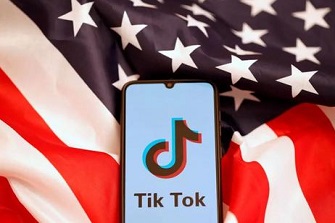
Hopes slim for US TikTok employee’s lawsuit against US government: lawyer
A US TikTok employee is reportedly seeking to file a lawsuit against US President Donald Trump's administration, but observers said there is little chance of winning the case. However, the company could find other legal strategies to defend its rights, they said. Patrick Ryan, a TikTok employee in the US, has started a crowdfunding campaign to raise funds to sue the Trump administration over the executive order forcing the sale of the US branch of the company.
2020-08-20 -
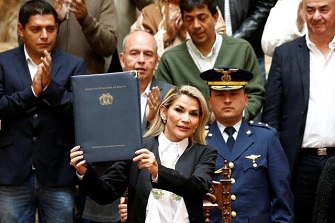
Vijay Prashad & Manuel Bertoldi: Will there ever be elections again in Bolivia?
On November 10, 2019, President Evo Morales Ayma of Bolivia announced his resignation from the presidency. Morales had been elected in 2014 to a third presidential term, which should have lasted until January 2020. In November 2019, protests around his fourth electoral victory in October led to the police and the military asking Morales to step down; by every description of the term, this was a coup d’état. Two days later, Morales went into exile in Mexico.
2020-08-19 -
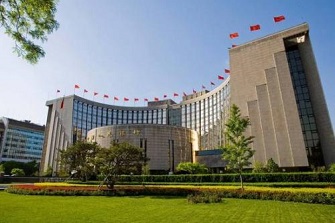
Liu Ying: Debt risks should be reduced to ensure smooth economic recovery
Guo Shuqing, chairman of China Banking and Insurance Regulatory Commission, has once again emphasized the importance of reining in financial risks, especially because the novel coronavirus pandemic has created uncertainties in China's external market and put downward pressure on the domestic market. That Guo's article, first published in Qiushi magazine, was also posted on the central bank's website on Sunday shows how important it is to control the financial risks.
2020-08-19 -

John Ross: UK's COVID-19 economic fallout: Is the worst behind us?
As governments around the world seek to save lives by slowing down the spread of the coronavirus, they have to take dramatic measures, with big implications for economic activity. John Ross, former Director of Department of Economy and Business Policy in London and senior fellow at Chongyang Institute for Financial Studies of the Renmin University of China, shares his thoughts on the economic impact of the coronavirus pandemic across the UK.
2020-08-19 -
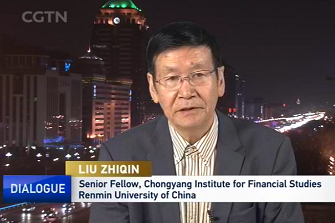
【CGTN Dialogue】Liu Zhiqin talked ahout China' s digital currency
On August 18, Liu Zhiqin, a senior fellow at the Chongyang Institute of Financial Studies, Renmin University of China (RDCY) was interviewed by CGTN Dialogue to share his view about China's Digital Currency.
2020-08-19 -
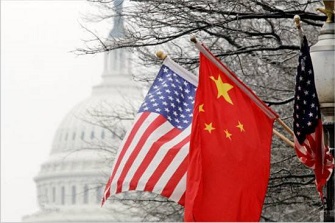
William Jones: Who should be blamed for deteriorating US-China ties?
It's perhaps understandable that some people may try to do self-examination of China policy at a point when US-China relations have slid to an unexpected low. But it is hard to see that China could have done anything differently to change the situation short of reneging on some of its most essential goals in the process of China's emergence as a major power on the world stage. In fact, compared to all the other countries in the world, China did everything right.
2020-08-19 -

Belarus unrest ‘won’t shake BRI cooperation’ with China
The ongoing protests in Belarus, a vital traffic hub in Eurasia, will not pose threats to the country's cooperation with China, especially on projects under the Belt and Road Initiative (BRI), and companies in the key industrial park and Chinese scholars are speaking highly of bilateral relationship. An employee of The China-Belarus Great Stone Industrial Park reached by the Global Times on Monday said that most of the Chinese companies in the park were not affected by the social unrest in Belarus, and the BRI projects in the country were unlikely to be impacted in the future.
2020-08-18 -
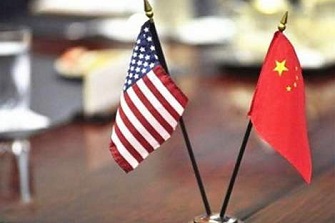
Zhao Minghao: China's multi-layered countermeasures against US
In the face of rounds of full-scale offensives launched by Washington against Beijing, some voices think China's countermeasures are not robust enough. But the fact is that when Beijing takes countermeasures, these measures must be proper responses. Tense issues relating to Taiwan, Hong Kong, the South China Sea and TikTok have recently been worsened by Washington. These are a combination of re-election tactics and profound changes in US policy toward China. Obviously, when Beijing responds to Washington, Beijing needs comprehensive considerations that blend its short-term and long-term interests.
2020-08-17 -
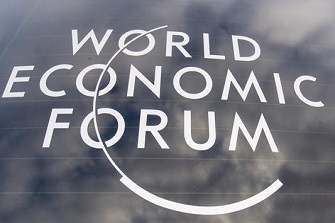
Peter Koenig: IMF and WEF – From Great Lockdown to Great Transformation. The Covid Aftermath
The WEF is an NGO, registered in a lush suburb of Geneva, with ambitions towards worldly power command. The IMF, created under the UN Charter, is an official international financial organization – one of the two Bretton Woods Institutions, the other one being the World Bank. The IMF was created to watch over and regulate the world monetary conundrum. Both, IMF and WB, are controlled by veto-power by the US Treasury. The discourse of both, the WEF and the IMF, is to “doing as much good to a covid-disaster stricken world as we can.” None of them mentions how their actions will put the world – especially the developing world, into even deeper ‘sustainable’ disaster.
2020-08-17 -
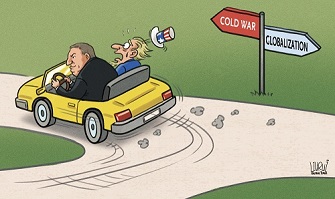
Czechs cold to Pompeo’s anti-China lobby
Chinese observers said that Central and Eastern Europe, which were torn apart by ideology during the Cold War, should not be fooled by US Secretary of State Mike Pompeo, who obviously still lives with a Cold War mindset, desperately trying to form anti-China cliques with his trip to the region. Three weeks after Mike Pompeo's infamous anti-China speech, which was widely considered a historic mistake, Pompeo on Tuesday began his visit to four central and eastern European countries—the Czech Republic, Slovakia, Austria and Poland.
2020-08-14 -
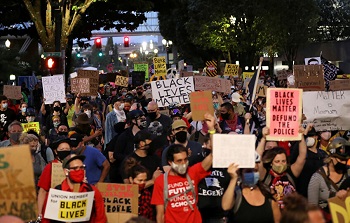
Zhao Minghao: America is torn from the inside
As Republicans and Democrats feud over the coronavirus relief bill, it is another sign that the cracks within the United States have deepened. With the election approaching, both parties are grasping at any opportunity to get ahead, even as COVID-19 and unemployment push tens of millions of Americans to the brink of despair. Washington D.C. has become Washington "Dysfunctional Capital," said Harvard professor Graham Allison. In the past decades, America would usually unite during a crisis, like after the 9/11 terror attacks in 2001, and deal with it like a global leader.
2020-08-13 -
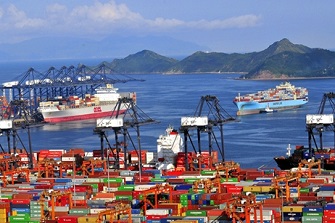
US companies staying put in China despite trade tensions: survey
Despite an unprecedented downturn in US-China relations amid the coronavirus pandemic, American businesses are not leaving the Chinese market, one of the world's largest, a report from the US-China Business Council (USCBC) showed. Five-year projections from US companies doing business in China are bullish, with nearly 70 percent expressing optimism about the market's prospects and 87 percent saying they have no plans to shift production out of China, the USCBC report said.
2020-08-13 -
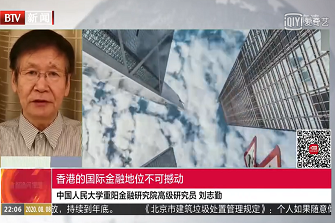
【Beijing TV】Liu Zhiqin: US attempts to sanction Hong Kong must not succeed.
On August 8, Liu Zhiqin, a senior fellow at the Chongyang Institute of Financial Studies, Renmin University of China (RDCY), was interviewed by Beijing TV. The interview focused on the US sanctions against Hong Kong, what is the purpose of the US government's so-called sanctions?What impact will the so-called US sanctions have on Hong Kong's finances?
2020-08-12 -

Liu Yushu & Liu Mingyang: Digital technology diversifies channels of poverty alleviation, making it a vibrant undertaking
The year 2020 is crucial for China to achieve the twin goals of building a moderately prosperous society in all respects and eliminating absolute poverty. Though hit by the novel coronavirus disease (COVID-19), the country is expected to complete its poverty alleviation plan on schedule, thanks in part to digital technology. The government encourages people to adapt to digital living and use the Internet to find opportunities and suitable ways to achieve prosperity.
2020-08-12 -
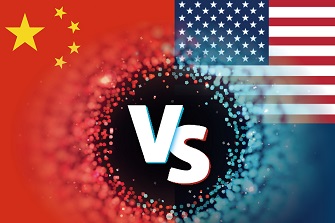
Wang Wen: US-China hot war hype scary hot air
Worry has been spreading within international public opinion fields - that a hot war between China and the US is about to break out. There have been rumors and speculation going around that the US could neutralize some of China's island bases in the South China Sea. Others say a military conflict may spark accidentally. Journalists have been interviewing scholars over the topic what, "if a war breaks out." There have even been rumors that some Chinese people are sharing the knowledge of civil air defense in their WeChat Moments. Anxiety is lingering.
2020-08-11 -
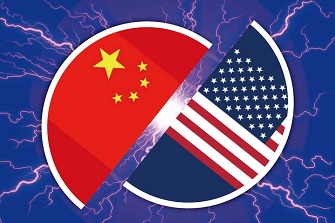
90% Chinese netizens disfavor US amid tensions, support strong retaliation against US: GT online survey
Retaliation measures enforced by the Chinese government in response to US provocations are overwhelmingly supported by the public, and increasingly more Chinese people disfavor the US amid the recent spate of unprecedented tensions since the two countries established diplomatic ties in the late 1970s, a survey showed on Monday.
2020-08-11 -

William Jones: As the 'Five Eyes' gear up to confront China, can anyone say that the British Empire is a thing of the past?
A recent article published in the China Economic Diplomacy Watch pointed to the "Five Eyes" – the U.S., UK, Australia, Canada and New Zealand – as the key rallying group for Pompeo's call for a containment policy toward China. The article has indicated a crucial element in the danger the world is facing. The unifying factor in this grouping is, firstly, that the "Five Eyes" are all English-speaking countries, and secondly, that they all at one time or the other belonged to the British Empire.
2020-08-11 -
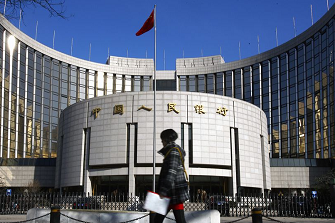
Djoomart Otorbaev: China takes a predominant role in sovereign debt management system
Facing the plight of COVID-19 and the looming economic prospects, governments and international organizations have devoted themselves to avoiding a debt crisis. According to recent reports, over 100 low- and middle-income countries will still have to pay a total of 130 billion U.S. dollars in debt service in 2020.
2020-08-10 -

TikTok may abandon US deal if pressured on pricing: experts
As uncertainties pile up in the potential deal between TikTok's US operation and a US buyer, TikTok is reported to have engaged in talks with several possible buyers, including Microsoft and Twitter. However, experts said the company may face further pressure from US President Donald Trump's arbitrary policies, and it is not impossible for TikTok to abandon the deal. Twitter - the most recent potential bidder for TikTok's US business - is said to have approached TikTok, but given the size of Twitter, it would be impossible for the company to acquire TikTok without engaging with other large institutional investors, some analysts said.
2020-08-10
























































































 京公网安备 11010802037854号
京公网安备 11010802037854号





